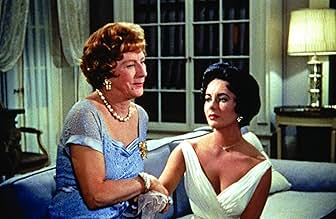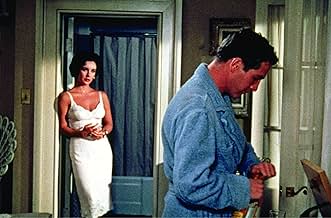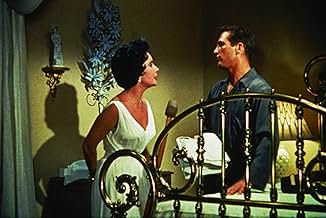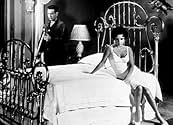Brick is an alcoholic ex-football player who drinks his days away and resists the affections of his wife. A reunion with his terminally ill father jogs a host of memories and revelations for... Read allBrick is an alcoholic ex-football player who drinks his days away and resists the affections of his wife. A reunion with his terminally ill father jogs a host of memories and revelations for both father and son.Brick is an alcoholic ex-football player who drinks his days away and resists the affections of his wife. A reunion with his terminally ill father jogs a host of memories and revelations for both father and son.
- Director
- Writers
- Stars
- Nominated for 6 Oscars
- 3 wins & 16 nominations total
Zelda Cleaver
- Sookey
- (uncredited)
Brian Corcoran
- Boy
- (uncredited)
Hugh Corcoran
- Buster
- (uncredited)
Kevin Corcoran
- Child
- (uncredited)
Patty Ann Gerrity
- Dixie
- (uncredited)
Bobby Johnson
- Pollitt Groom
- (uncredited)
Walter Merrill
- Party Guest
- (uncredited)
Deborah Miller
- Trixie
- (uncredited)
Robert 'Rusty' Stevens
- Sonny
- (uncredited)
Vince Townsend Jr.
- Lacey
- (uncredited)
- Director
- Writers
- All cast & crew
- Production, box office & more at IMDbPro
Featured reviews
Much has been made of the differences between Tennessee Williams' play and this film--the homoerotic themes have been driven further into subtext (though not eliminated entirely) and a more upbeat ending was added. The changes were necessary when the film was made; although theater and literary purists decry the "sanitizing" or censorship of plays when they are adapted for the screen, in some cases (such as this one) the changes can improve the work in question. "Cat" on film is clearer, for one thing. Tennessee Williams plays tend to be "cluttered" in their original form. They are also cynically downbeat; if that type of story appeals to one, this adaptation might be off-putting.
As with all theatrical adaptations, many of the scenes are excessively talky, especially the Brick/Big Daddy scenes in the second act. Some of the highlights are just as wordy but thoroughly enjoyable rather than tedious (especially Maggie's story about Mae's reign as Cotton Carnival Queen and the entire scene in the basement). All of the performances are excellent, though Paul Newman as Brick is less flashy; it's not really until the basement scene that one feels his talent is given a workout. Elizabeth Taylor is an emotional rollercoaster, venturing from flirtatious to hectoring to wheedling to calm to grasping to tender, often within a single scene, and yet she never slips the rails. Watching films from this period (her career peak), one wonders what happened to turn her into the vague, bleary-eyed woman we see today. Judith Anderson's Big Mama is loud, coarse, and bossy, but completely sympathetic both in the scene with the birthday cake and in the confrontation scene at the end. When Big Daddy invites her along with him at the end, it is every bit as welcome to the viewer as it is to her. Burl Ives is the most towering of all; the emotional growth in the film is as much his as it is Brick's. Jack Carson and Madeleine Sherwood are every bit as good despite being relegated to comic relief at times.
My favorite aspect of this story, however, is the social dynamic. Brick and Maggie are spoiled, young, "beautiful people" who have yet to take on any responsibility, while Gooper and Mae are the epitome of a serious young family. Brick is an alcoholic former football player, while Gooper is a corporate lawyer. Despite these obvious differences, however, both their parents and the audience (and Tennessee Williams, obviously) clearly prefer Brick and Maggie. Every aspect of Gooper and Mae's personalities, even those which bespeak traditional values, are portrayed as petty and unimaginative. Even if one believes that Gooper and Mae have done all the right things, they have done them for the wrong reasons. Thus the theme of the story is most clearly presented: all that is important is to love and to express that love.
As with all theatrical adaptations, many of the scenes are excessively talky, especially the Brick/Big Daddy scenes in the second act. Some of the highlights are just as wordy but thoroughly enjoyable rather than tedious (especially Maggie's story about Mae's reign as Cotton Carnival Queen and the entire scene in the basement). All of the performances are excellent, though Paul Newman as Brick is less flashy; it's not really until the basement scene that one feels his talent is given a workout. Elizabeth Taylor is an emotional rollercoaster, venturing from flirtatious to hectoring to wheedling to calm to grasping to tender, often within a single scene, and yet she never slips the rails. Watching films from this period (her career peak), one wonders what happened to turn her into the vague, bleary-eyed woman we see today. Judith Anderson's Big Mama is loud, coarse, and bossy, but completely sympathetic both in the scene with the birthday cake and in the confrontation scene at the end. When Big Daddy invites her along with him at the end, it is every bit as welcome to the viewer as it is to her. Burl Ives is the most towering of all; the emotional growth in the film is as much his as it is Brick's. Jack Carson and Madeleine Sherwood are every bit as good despite being relegated to comic relief at times.
My favorite aspect of this story, however, is the social dynamic. Brick and Maggie are spoiled, young, "beautiful people" who have yet to take on any responsibility, while Gooper and Mae are the epitome of a serious young family. Brick is an alcoholic former football player, while Gooper is a corporate lawyer. Despite these obvious differences, however, both their parents and the audience (and Tennessee Williams, obviously) clearly prefer Brick and Maggie. Every aspect of Gooper and Mae's personalities, even those which bespeak traditional values, are portrayed as petty and unimaginative. Even if one believes that Gooper and Mae have done all the right things, they have done them for the wrong reasons. Thus the theme of the story is most clearly presented: all that is important is to love and to express that love.
Elizabeth Taylor's death a few days ago prompted me to watch one of her most famous movies.* I've never seen a stage production of Tennessee Williams's "Cat on a Hot Tin Roof", but I will say that the movie version is worth seeing, despite the unrealistic southern accents. The storm taking place outside the mansion is nothing compared to the tension between all the family members gathering for the patriarch's birthday.
As with another notable Tennessee Williams play -- "A Streetcar Named Desire" -- they had to remove the references to homosexuality to bring the movie to the silver screen. Still, the scenes of Maggie (Taylor) in her slip seem as though they would have been risqué for the time. Along with her, just about every character made me feel as if my throat was going to constrict. In a way, it's as if the only truly benign characters were the servants.
All in all, I wouldn't call this movie a supreme masterpiece, but I found it to be worth seeing. This one, along with "Streetcar" and "Baby Doll" are the three great adaptations of Tennessee Williams plays. Also starring Paul Newman, Burl Ives, Judith Anderson (Mrs. Danvers in "Rebecca"), Jack Carson and Madeleine Sherwood (Reverend Mother on "The Flying Nun").
*This is going to sound insane, but prior to "COAHTR", the only movie in which I'd seen Elizabeth Taylor was the god-awful "Flintstones" movie, in which she played Wilma's mother.
As with another notable Tennessee Williams play -- "A Streetcar Named Desire" -- they had to remove the references to homosexuality to bring the movie to the silver screen. Still, the scenes of Maggie (Taylor) in her slip seem as though they would have been risqué for the time. Along with her, just about every character made me feel as if my throat was going to constrict. In a way, it's as if the only truly benign characters were the servants.
All in all, I wouldn't call this movie a supreme masterpiece, but I found it to be worth seeing. This one, along with "Streetcar" and "Baby Doll" are the three great adaptations of Tennessee Williams plays. Also starring Paul Newman, Burl Ives, Judith Anderson (Mrs. Danvers in "Rebecca"), Jack Carson and Madeleine Sherwood (Reverend Mother on "The Flying Nun").
*This is going to sound insane, but prior to "COAHTR", the only movie in which I'd seen Elizabeth Taylor was the god-awful "Flintstones" movie, in which she played Wilma's mother.
The best thing Cat on a Hot Tin Roof has going for it is one truly remarkable acting performance. And that performance comes from neither Elizabeth Taylor nor Paul Newman. There's nothing wrong with the work turned in by Taylor and Newman, they are both perfectly fine in their roles. And it is their characters who are the focus for most of the film. But late on in the proceedings Burl Ives grabs hold of the film and makes it his own. Ives turns in a performance which is so strong and powerful that it threatens to overshadow and overwhelm everything else in the film. However it is rather difficult to overshadow Elizabeth Taylor and Paul Newman. And the film's rather simple story is certainly compelling enough so as not to be overwhelmed by the Ives tour de force near the end. So while Ives may end up being the most memorable thing the film has to offer he is certainly not the only memorable thing. His great performance is merely the best part of what is an overall thoroughly satisfying film.
The film's simple story centers around a day in the life of a wealthy Southern family. With this family the key word is "mendacity". What does that even mean? Any of our characters who initially don't know about mendacity surely will by the time the story plays itself out. As we meet them everyone has come together to celebrate the 65th birthday of family patriarch Big Daddy. Initially it seems the film is about Big Daddy's son Brick and his wife Maggie the Cat. Brick and Maggie are not currently in the throes of wedded bliss. To say their relationship is strained would be putting it mildly. The fact that alcohol seems to be the only thing in life Brick is at all interested in probably does not help matters. But as the film progresses we see there is a larger issue than Brick and Maggie's troubled marriage. Big Daddy is dying. And nobody, not his family and not his doctors, has the guts to tell him. This will ultimately play itself out in powerful, heartrending fashion.
For much of the film's running time you would call it compelling but certainly not spectacular. But then Ives, as Big Daddy, grabs the film by its throat and shakes some real life into it. There's a scene where Ives as Big Daddy and Newman as Brick are alone in a basement which simply could not have been performed any better. There's so much these characters have to say to one another. The emotion is raw and the scene is so powerful. It hits you right in the heart. Just this one scene alone, with these two great actors, elevates the film all by itself. Newman is terrific. Ives is astounding. Perhaps it is in fact possible to overshadow Elizabeth Taylor. Maybe just this once. Maggie the Cat is an intriguing character in her own right and Taylor certainly doesn't disappoint in the role. But it turns out that ultimately the film is really about the relationship between Brick and his father, not Brick and his wife. And as such it is Newman, and most especially Ives, who you will most remember. It is their work which transforms a good movie into something truly memorable.
The film's simple story centers around a day in the life of a wealthy Southern family. With this family the key word is "mendacity". What does that even mean? Any of our characters who initially don't know about mendacity surely will by the time the story plays itself out. As we meet them everyone has come together to celebrate the 65th birthday of family patriarch Big Daddy. Initially it seems the film is about Big Daddy's son Brick and his wife Maggie the Cat. Brick and Maggie are not currently in the throes of wedded bliss. To say their relationship is strained would be putting it mildly. The fact that alcohol seems to be the only thing in life Brick is at all interested in probably does not help matters. But as the film progresses we see there is a larger issue than Brick and Maggie's troubled marriage. Big Daddy is dying. And nobody, not his family and not his doctors, has the guts to tell him. This will ultimately play itself out in powerful, heartrending fashion.
For much of the film's running time you would call it compelling but certainly not spectacular. But then Ives, as Big Daddy, grabs the film by its throat and shakes some real life into it. There's a scene where Ives as Big Daddy and Newman as Brick are alone in a basement which simply could not have been performed any better. There's so much these characters have to say to one another. The emotion is raw and the scene is so powerful. It hits you right in the heart. Just this one scene alone, with these two great actors, elevates the film all by itself. Newman is terrific. Ives is astounding. Perhaps it is in fact possible to overshadow Elizabeth Taylor. Maybe just this once. Maggie the Cat is an intriguing character in her own right and Taylor certainly doesn't disappoint in the role. But it turns out that ultimately the film is really about the relationship between Brick and his father, not Brick and his wife. And as such it is Newman, and most especially Ives, who you will most remember. It is their work which transforms a good movie into something truly memorable.
I've got to say that Tennessee Williams' 'Cat On A Hot Tin Roof' was one of the best Newman films. It's one of those movies that grabs your attention in the first 10 minutes. The interactions between the gifted actors and actresses were stupendous. I really felt for Maggie (Elizabeth Taylor) "The Cat ", though and how she was able to keep her composure with her husband Brick Pollitt's (Paul Newman) berating of her. We learn that he was a drunk trying to recapture his glory days of high school sports by leaping hurdles on a track field, dreaming about his moments as a youthful athlete, but suddenly he falls and breaks his leg, leaving him dependent on a crutch. During the film, he has some harsh words for Maggie. I felt that her character was treated unfairly by Brick and to make matters worse, his father Big Daddy (Burl Ives), shows nothing, but contempt for his son that he's even violent towards him. I really understood why he was so angry with Brick and as you watch the verbal fight between the two, you really side with Big Daddy. Newman really was a great actor and was the best choice for this part. Taylor, on the other hand, is a big star And she played Maggie to a T! I really think the Hollywood scripts these days are dead weight compared to the 50s and 60s! The exchanges of dialog and the acting were definitely marvelous. Canadian actress Madeleine Sherwood, who played Mae Pollitt in the film, was the last one to pass away in 2016 at 93! they all left their mark in the acting world.
I have never read or seen the play 'Cat on a Hot tin roof', but after watching the quite superb film, I want to. A movie about families, money, love or lack off. The acting is first rate, Paul Newman and Elizabeth Taylor are superb, if you're looking for laughs, look elsewhere. A classic.
Did you know
- TriviaDespite being really affected by her husband Mike Todd's death, Elizabeth Taylor resumed her job in a very professional way, without any delay on the set. Everyone was astonished by her determination.
- GoofsAfter Brick tries to drive away and gets stuck, Maggie goes out to him and helps him into the house through the pouring rain. Her hair is soaking wet, but the next time she is seen, it's perfectly dry and styled.
- Quotes
Harvey 'Big Daddy' Pollitt: I've got the guts to die. What I want to know is, have you got the guts to live?
- ConnectionsEdited into Hollywood: The Dream Factory (1972)
Details
- Release date
- Country of origin
- Language
- Also known as
- Un gato sobre el tejado caliente
- Filming locations
- Metro-Goldwyn-Mayer Studios - 10202 W. Washington Blvd., Culver City, California, USA(studio: made in Hollywood, U.S.A. by)
- Production company
- See more company credits at IMDbPro
Box office
- Budget
- $3,000,000 (estimated)
- Gross worldwide
- $1,872
- Runtime1 hour 48 minutes
- Color
- Aspect ratio
- 1.85 : 1
Contribute to this page
Suggest an edit or add missing content
































